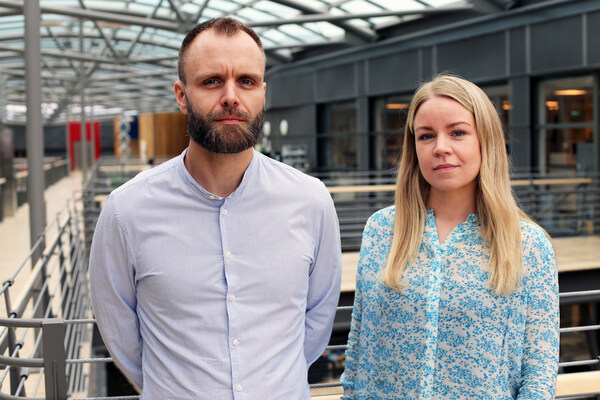 |
REYKJAVIK, Iceland, May 21, 2025 /PRNewswire/ — In a study published in Nature today “Sequence diversity lost in early pregnancy,” scientists from deCODE genetics, a subsidiary of Amgen, estimate that around one in 136 pregnancies are lost due to new mutations in the fetus. In other words, millions of pregnancies worldwide are lost because of mutations every year.

Hakon Jonsson and Gudny Anna Arnadottir scientists at deCODE genetics and authors on the paper in Nature
The human genome varies between individuals, but there are some locations in the genome where there seems to be little or no sequence variation between individuals. This raises the question whether the sequences at these locations are essential for human development? It is known that mutations in essential genomic sequences are major contributors to neurodevelopmental disorders, the question remains, do they also contribute to pregnancy loss?
As part of a Nordic collaboration, scientists from deCODE genetics sought to answer these questions by sequencing 467 samples from pregnancy losses from a prospective study initiated by Henriette Svarre Nielsen and Eva R. Hoffmann.
Interestingly, by comparing the genomes of the fetuses from pregnancy losses to their parents the scientists found that the fetuses harbored a similar number of new mutations as adults.
“Despite the similar numbers, we discovered that the main difference between the lost fetuses and adults was that the mutations in the fetuses occurred in essential genomic sequences,” says Hákon Jónsson scientist at deCODE genetics, and one of the authors on the paper.
Moreover, they managed to pinpoint when, in the development of the fetus, some of the mutations occurred.
In addition to mapping new mutations in the lost fetuses, they also showed that some couples are at a higher risk of pregnancy loss due to genetic compatibility issues. You inherit one copy of a gene from each parent, and most of the time, you are fine with one defective copy, but problems can arise if you inherit a defective copy from both parents.
“We have shown previously that for certain genes, you never observe two defective copies in adult genomes, but we found two defective copies in some of the pregnancy losses. Importantly, these involve a high risk for recurrence of pregnancy loss for the couple but can be selected against in IVF treatments,” says Guðný A. Árnadóttir scientist at deCODE genetics, and one of the authors on the paper.
Along with recombination, the continuous generation of mutations enables us to evolve as a species. However, this continuous influx of new mutations comes at the expense of rare diseases. This study demonstrates the contribution of mutations to pregnancy loss and sheds new light on conserved sequences in the human genome.
Based in Reykjavik, Iceland, deCODE genetics is a global leader in analyzing and understanding the human genome. Using its unique expertise and population resources, deCODE has discovered genetic risk factors for dozens of common diseases. The purpose of understanding the genetics of disease is to use that information to create new means of diagnosing, treating and preventing disease. deCODE genetics is a wholly-owned subsidiary of Amgen.


